Gary Reed, Statesman of the Biz Reloaded

Gary Reed, owner and operator for Caliber Publishing, has long been a writer, an editor, a packager and publisher, a teacher, a retailer, a mover and a shaker. Here he opens up about his history and ethos, as only he can.
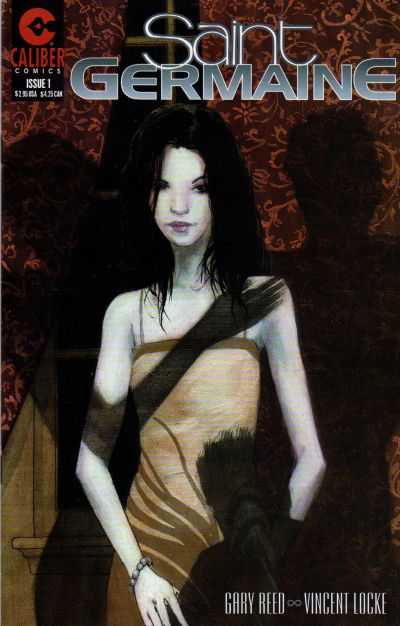
Gary, if I were to sum up your character after years of following your work, I would say “industrious”. Was that attribute a product of your up-bringing, or something learned at Hard Knocks U?
That’s an interesting word choice, but I do think it fits as I believe most of what I accomplished has been through hard work. I’d attribute it more to my upbringing, as I grew up in the projects in my younger years. My dad was a big war hero in Korea, won the Silver Star, and knew of some 20 people that he killed, and came back home at the age of 20. He never graduated high school, nor did my mom, and he spent years bouncing from one menial job to the next as mom kept popping out kids. When we finally moved out of the projects, it was actually to a smaller house–basically a front room, a kitchen, one bathroom, and two bedrooms. So, we had six boys sharing one bedroom. We didn’t even have a closet or dressers, our clothes were kept in a beer box.
So, if we wanted anything of our own, we had to work for it. My brothers and I would shovel snow, cut grass, do Christmas caroling…anything to get spending money as there was no such thing as an allowance. My first hourly job was at an auto parts shop when I was 12 and I swept the floors, cleaned the toilets, and other odd jobs there. That was about the time I started doing paper routes. I remember I had to “borrow” a friend’s bike until I made enough money to buy my own. I think I was about 14 when I started working at night as a carpenter’s apprentice which basically meant carrying all the supplies and cleaning up after. While I was in middle school, I’d go in at 10 o’clock at night and work until 6 or 7 in the morning and then head off to school. I did that for a couple of years averaging about two nights a week. The pay was good and had to be because even if we wanted new clothes, we had to buy our own. When I went into the 8th grade, my dad, who was working steady at the time, bought us all new clothes and it was the first time I remember having new clothes as we were always the family down the street to donate to. But after that time, we were on our own.
I always worked. During the summers, I’d work landscaping from dawn to dusk and I tell you, that was brutal, but I always had a good tan, at least. Work was really the only option we all had and we really didn’t plan our lives. In Detroit, the primary options after high school, if you graduated, were jobs in factories, the military, or prison. I had a brother in prison and another in the military and those two, along with factory jobs, didn’t sound too appealing. I did manage to graduate high school, barely, as did another of my brothers but the rest dropped out.
To this day, I’m not sure why I decided to attend college. It was completely off my radar for my entire life up to the time I signed up. Even my dad told me it was a waste of time and I should go into a trade. I think most likely that the girl I was dating, Jennifer, who would eventually become my wife, had her life mapped out to go to college after high school. That seemed a bit foreign to me at the time but figured it was an option I should explore. So, I worked full time, sometimes up to 60 hours a week, and attended college at night. It took me about 5 years to get my two year Associate’s degree but later, I got my Bachelor’s and then a Masters.
So, yeah…industrious if you mean working.
So if pennies were always stretched in your world, how did you come to focus on funny books, where fandom and consumerism seem to be synonymous? Were you much of a fan yourself, or was the industry a vocational outlet for those degrees you earned?
Well, showing my age a bit here, when I started reading comics as a kid, there was no fandom or consumerism, they were just comic books on a spinner rack at drugstores. I lived in the city and once or twice a week, we’d walk about two miles to my grandma’s house. We’d get paid to clean up the yard, rake leaves, mow the lawn, stuff like that. On the way back, we’d stop at the drugstores which all had soda fountains. We’d buy a soda or snack and read the comics while at the counter. I remember I used to get a root beer and barbeque chips. I have no idea how many comics I would read but it was quite a few before we’d get told to leave. Then we would just head to the next store and sit on the floor and read comics until we got kicked out again. I think there were five or six stores on our way. Sometimes we would buy a comic or two and there was usually my twin brother, Terry, and Howie who was just a little over a year older and we’d share them. I know we pretty much read any comic whether it was Archie, Gold Key, DC, or Marvel. Marvel was fairly new at the time…again, showing my age. I remember distinctly when Daredevil went from the black and yellow costume to the red one. All of us were avid readers as was my mom. She’d go through a trashy novel a day but being so poor, books from the library were our primary entertainment. So, we could read them pretty fast and of course, back then, comics were really quick reads.
I didn’t read comics as a teenager. I hadn’t seen a comic for years at that time. I didn’t know anything about comic fandom until after I opened my first store. While in college, I opened my first bookstore. I don’t remember visiting too many bookstores as a kid so when my wife got accepted at University of Michigan, we made the move from Detroit to Ann Arbor. That was a completely different environment, I might have been a bit shell shocked when first there. And back then, Ann Arbor was known for its many bookstores, especially used ones. I was hooked. Again, we were limited financially as I had to put her through school and of course, Michigan was really expensive. We qualified for low income housing and had to drive junkers all the time but we were in Ann Arbor. To this day, I still don’t know what compelled me to open a book store but I found that you could buy them really cheap at book sales and that you could do trade-ins. My wife had just graduated and for the first time, we had a decent income and I was going to finish off my bachelor’s as a full time student for my final year.
Of course, I remembered comics and felt that I could add those to the store as an incentive for kids. That’s when I discovered you could go through a comic distributor and I dealt with a local company called Glenwood. I had no idea of what I was doing, I just went in and ordered like three of every comic to start. It was the customers who first started educating me and then I found out about comic conventions and Comic Buyer’s Guide and so on. The first year was quite a learning curve but I approached it like a class and just read up on everything I could. That’s when I realized comics weren’t primarily for kids and the direct market was beginning to replace the newsstands as the primary distribution of comics. This would have been in the early 80s.
I stayed at school for my Master’s because I got a free ride and was paid to be an undergrad instructor at the same time so continuing on with my Master’s was actually a job at the same time. I found grad school much easier than undergrad because it involved a lot of self-study and writing papers, and I found I had a knack for writing so the term papers and dissertations that troubled others were a breeze for me. Undergrad classes often had assignments and projects which I always found to be busy work but grad school, you were pretty much on your own. You were given things to do and a due date and it was up to you to do it. The teaching load wasn’t too hard and it was mostly biology labs so I didn’t have to do a lot of prep work. By the time I graduated, I think I was up to four stores and two of them only featured comics, no books.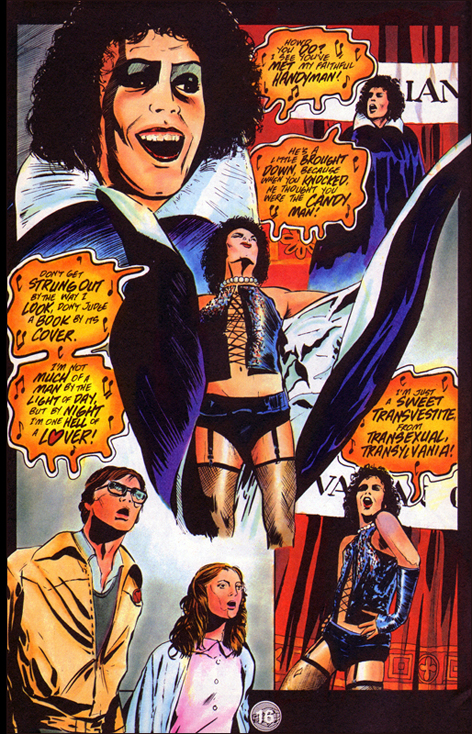
That is amazing, Gary. You’ve accomplished more there by this point of the playback machine than so many other folks do today. I’ve read elsewhere of how you eventually stepped in to help get certain indie titles out there to the world, but was there a singular moment for you when Caliber felt like a full-on business, like something structured and purposed?
Well, for the first part, I was always a big supporter of the indies way before I started Caliber. I had my stores for 7-8 years before Caliber was even a thought. At that time, the indies, to me anyway, were the future of comics. There was a lot of great stuff coming out that could appeal to the mass audience. I felt the market was too reliant on superheroes and it seemed that stranglehold was about to be broken. It’s sorta like cable TV now. A lot of quality and innovative shows against the generic broadcast TV. But the cable channels managed to pull audiences away and establish themselves as powerhouses. That never happened with comics. Sure you had Image in the 90s but for the most part, that was just another superhero line. Corporately they were different but the product was indistinguishable except for being a bit more graphic. I had a radio and a TV show and we used to bring in a lot of independent creators. I had frequent store signings with people like Bill Loebs, Don Simpson, the Arrow Publishing guys, Innovation Comics, and others. At the store, we carried every title that came out and I pushed the independents hard. That’s what made us unique and frankly, the Marvel-DC-Image didn’t need any promoting. I had guys that worked at other comic shops come in once a week to buy independents from us. And I got into publishing when I was trying to find a publisher for Vince Locke with Deadworld and Guy Davis with the Realm. Somewhere along that line, I decided I’d just do the publishing myself.
As for when Caliber felt like a full on business, that’s a little hazy. Since I had the stores, Caliber was initially just an offshoot of that so all the accounting was taken care within the framework of the store. I was already paying FICA, unemployment insurance, and filing all the tax forms so with Caliber, the business side was just a shifting of what we were already doing. If I had to peg down when it became a bit more real, it was likely when I brought in Kevin VanHook. He was hired and had to move from out of state with his family so that was a major step. I was overwhelmed with all the titles as we were growing so fast so he helped out immensely with production and editorial duties as I was doing all that myself. Around that time also, I got the rights to do the Rocky Horror Picture Show comic adaptation so it probably felt a bit more real to be dealing with the lawyers from 20th Century Fox.
Thinking about it, maybe when I started thinking of Caliber as a viable business was the impact that it had on some people. I’m not talking about sales or content but one of the toughest things to deal with was submissions. Obviously, most were easy to turn down and even the submitters knew if they weren’t really ready but there were some good books that I had to say no to. And to some people, this was their opportunity to follow their dream and here I was squashing it. I usually took the time to explain that a rejection was just one person’s viewpoint and to keep trying and I always pushed the self-publishing route. In fact, I did a guideline for self-publishing that was circulated quite a bit and Dave Sim even ran it in one of his issues of Cerebus. The books that were close…that was hard when you had to say no. Sometimes it was just because we had something similar but mostly, it was something that just didn’t feel true to me for whatever reason. I hated going through submissions with a passion even though I did find some great titles. Usually when I picked up a title, I could tell at the first glance whether it would be something I wanted to publish or not.
So, there never was a singular moment but obviously, it was a small seed that grew although I can’t categorically say when that moment hit me.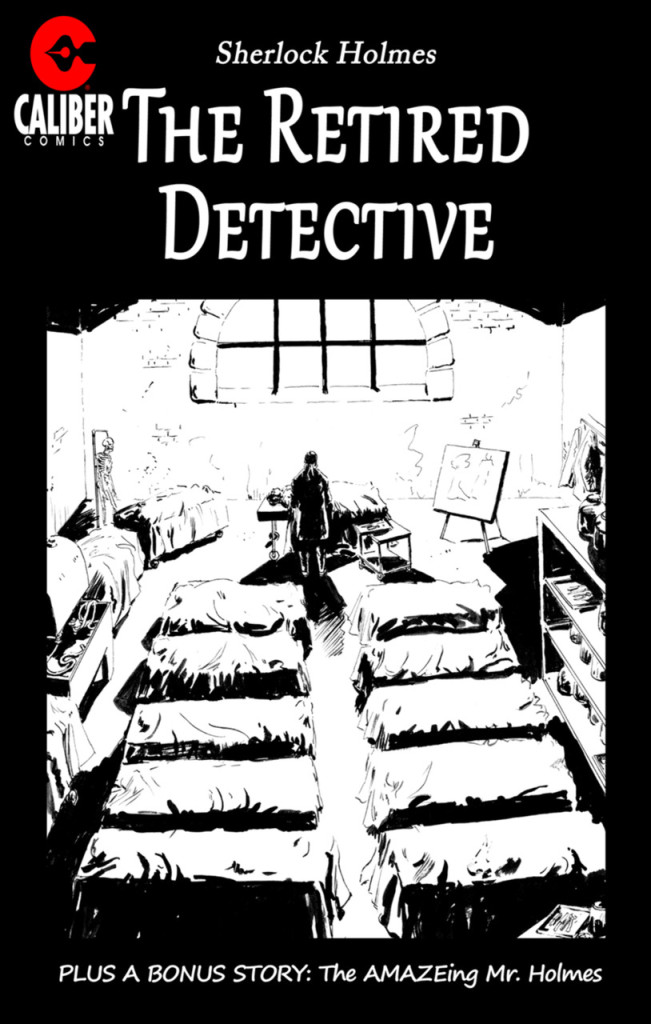
I started really reading your books regularly in the early-90s, when you had the Ammunition newsletter going. I remember thinking how much more fun the Realm of the Dead crossover was than the Deathmate thing from Image/VALIANT that hit about the same time, and I believed then that what your line offered was probably the most diverse of any American publisher at the time. I think a lot of readers were exposed to a great deal of different talents through Caliber, like having creators as diverse as Brian Bolland, Jeff Smith and psychiatrist Malcolm Bourne all in a single issue of Negative Burn; or the Steve Jones/Wayne Reid pairing for Worlds of Lovecraft. You mentioned the pangs of having to turn down projects, but to play devil’s advocate, with the volume of material you put out, were there books that you ever regretted?
Oh yeah…there were some clunkers. I mean I appreciate when people tell me I had a good eye for new talent but generally, we always focus on what worked. There were some that didn’t…and of course, I’m not going to name them. There were a couple of times when I saw 10-12 pages and then when the book actually came in, the story and/or art just totally fell apart. I think what happened a few times also is that the creators involved just weren’t up to the challenge and they got overwhelmed. One of the problems Caliber had were cancelled series but frequently a creator would embark on their dream project but after an issue or two, they just ran out of energy. Being creator-owned, I couldn’t put another artist on it so it just fizzled out. That’s the downside of creator owned books as they’re usually reliant on a single person. Some of the regrets didn’t deal with specific books but rather certain creators. You never know how a relationship is going to turn out and there’s been a few creators I’ve worked with that I wished I had said no right from the get-go and never had to deal with. You know publishers always get the bad raps but there’s quite a few creators out there who are not only slow but are just outright liars. Of course, creators are people so you’ll always have some bad ones but most of the time in the press, everyone sides with the creator. I learned early on that I won’t ever win a public relations battle with a creator as the public sees them as always right and publishers are blood sucking scum, so you just have to let it go. But that’s rare and I think there’s only two creators that I worked with that I would never speak with again, mainly because of the lies they’ve spread. There’s not much you can do about it. 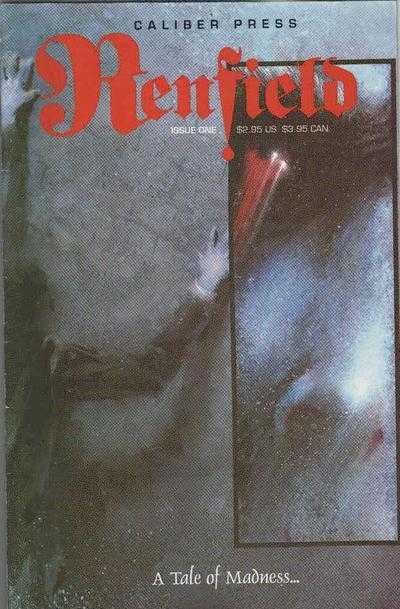
Which was the first story of your own body of work where you felt you succeeded in surpassing even your own expectations?
Hmmm, that would be a tough one. My first stories were a short in Caliber Presents called “True Love” and of course, Baker Street. “True Love” worked mainly because of the fantastic art of Mark Bloodworth and Vince Locke. Even today, it’s one of my favorite drawn stories that I’ve written. Baker Street was a collaborative effort and over time, Guy wanted more control so not that one. Besides, I cringe whenever I look at the first issue and the accents I tried to put in. I’ve never done accents again. I did a couple of things that I prefer not to see again. I guess if I had to pick the first one, it would probably be Renfield. For those that don’t know, Renfield was the bug-eating inmate from the Dracula novel and I wrote the series from his point of view. I mean, here was a perfectly sane and intelligent man possessed by a vision of immortality coming to him so he was declared insane. I think the story worked out well and I was happy with it. Being a complete tale with a beginning, middle, and end gave a satisfactory completeness to it. Some reviewers have said it is a mix of an adaptation with some new scenes added but outside of the events happening, pretty much there is nothing from the Dracula novel itself. I feel it has missing scenes that weren’t in the original novel. So, yeah, always felt good about that one. When a couple of colleges starting using it in their literature class, I think that cemented it for me. So, Renfield always remains one of my favorites, along with Red Diaries and Saint Germaine.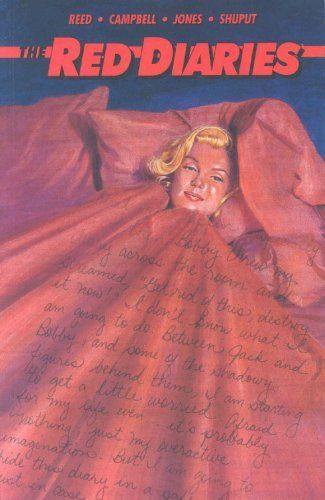
On the topic of scholarly appreciation, something I’ve wondered at was how the Tome Press line came about. They were such a dizzying array of subjects, like a less-PG version of Classics Illustrated. Were many of the properties in the Public Domain, or was there need for any licensing finagling on your part? And I would imagine if such a line came around today that it would meet with critical acclaim but sadly, lackluster sales, being such nifty educational tools. What were the responses by your memory?
The Tome line, which was material centered on history, biography, and literature, came about because I always felt books like that were a huge hole in the comic world. I envisioned the line to be a lot of single issues dealing with a variety of topics in those areas and for the most part, that’s what it was. We had some series such as Sherlock Holmes, Lovecraft, and King Arthur but most of the Tome line were single issue reference or literary adaptations. I wrote almost all of them and then some, spent an enormous amount of time on them. The issues on the Russian Revolution and While 50 Million Died, which was a factoid book on World War II, took an incredible amount of research…but I loved every minute of it. I did an adaptation of Dante’s Inferno which I translated from the old English and that was incredible time-consuming and I never finished the last third. A lot of people liked the art book series where we did looks at artists such as Goya, Remington, Mucha, Beardsley, Currier & Ives and we also did a series of famous art print series. I only wish we had the production capabilities we have now to do those as some of the production was pretty poor for that time. But they were meant to be introductory looks, not a comprehensive overview.
I kept to the public domain as I didn’t want to worry about licensing and most of the material was classic which usually means old.
I’ll find out how sales will be now, at least digitally as most of the Tome line will be available in digital format, and some of it already is. When the line first came out, some titles did well, some floundered…just like any line of comics. But they had a long life because they were self-contained issues and we had a great deal of re-order activity. Not through the distributors but through individual comic shops and we had quite a few that placed regular re-orders like clockwork. The Tome titles were our most ordered titles from consumers from our website and Caliber was one of the first publishers to have a storefront on the Internet way back in the 90s. They sold to people who ordinarily didn’t read comics so that gave us an incredible potential audience. Plus we had major distribution outside of the comics market, for example, Wal-Mart ordered 10,000 each of 10 titles and then 65,000 of one title. I would never get that in the direct market.
It’s funny that some people seemed to detest the Tome line as it wasn’t “real” comics. But I’d put the adaptations of A Modest Proposal by Phil Hester, Pied Piper of Hamelin by Dave Cooper, and Man Who Would Be King by Paul Daly up against most comics. Those were great adaptations. Harlan Ellison was a fan of the Tome line and one time at San Diego, he stopped by our booth to talk up the line with the fans walking down the aisles. He was on our comp list for a long time as we appreciated his appreciation.
Someone sent me a link to a Comics Journal interview with a well known creator who started at Caliber and they were poking fun at the Tome line. It was surprising that was coming from Comics Journal. I forget what specific titles they were talking about but the creator had done some 15 books at Caliber and almost the entire Tome line outsold all of his books.
Much of the Tome line will be available in print or digitally from Caliber over the next few months and I will likely be doing more. Some of the titles such as True Spy Stories and The Plague were single issue releases and are being expanded to become graphic novel length. I have to say that the Tome Press is likely what will keep me involved with comics.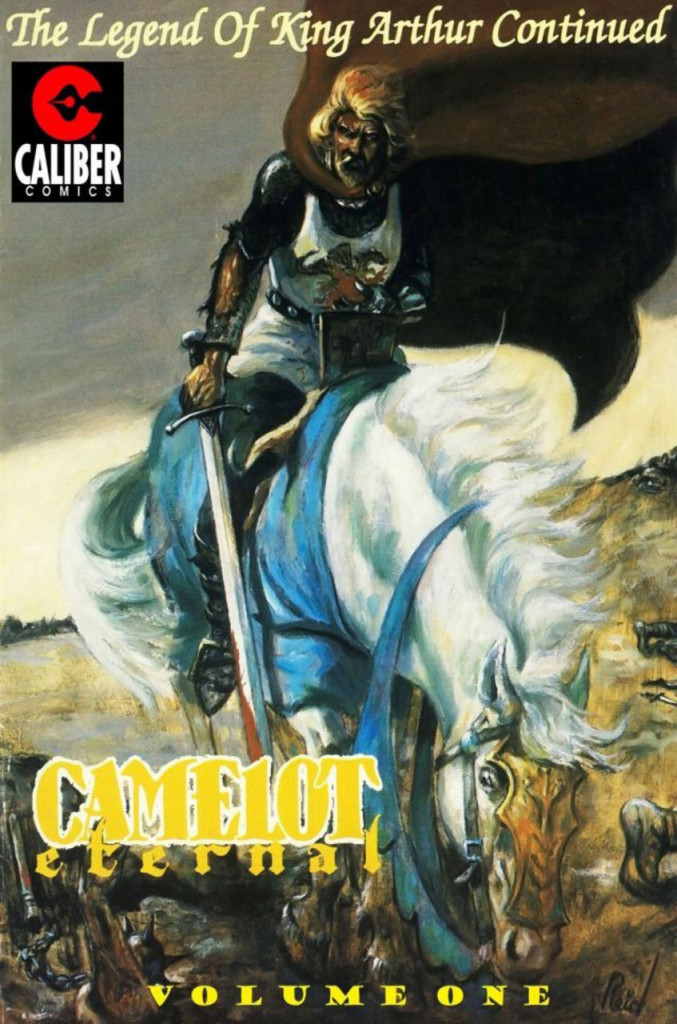
Not to jump too far ahead, but I wondered if your work with Byron Preiss, if given the chance, might have eventually led to some form of Tome revival under his label. Was that ever in the cards, or was it more of a freelance thing for you at the time, prestigious though it was?
I’m not sure how the relationship with Bryon started. I think we met at San Diego years prior and we seemed to have a good rapport. I’d talk to him on the phone occasionally and anytime we were at a show together, we’d get together for a bit but we had no real relationship. I think we just felt the same about a lot of things in the industry. After I dropped out of comics when I closed Caliber, he contacted me a couple of years later and asked if I would come back to comics and work with him on some projects. The first thing was to collect the Baker Street graphic novel, which we did. He was working with Penguin Books, specifically Puffin, the younger version, and asked me to write some adaptations. I became the “horror” guy for the line and did Frankenstein with Frazer Irving and Dracula with Becky Cloonan. I was lined up to do more and I think Phantom of the Opera was next in line. He then asked me to spearhead doing a line of books on musicians with his editorial staff and I remember saying the Beatles had to be the first one and he agreed so I started writing that with R.G. Taylor doing the art. About half of the book is done and I keep planning on doing something with it. I also requested that I’d write the book on George Harrison as well. As that was progressing, he was contacted, and I don’t think it was Penguin but another publisher, about a line of books dealing with American History. We were mapping out some ideas when he was tragically killed in a car accident. I enjoyed working with Byron and it was kind of nice just to be a writer and not have to worry about the business side of things, plus I got paid pretty well.
So, yeah, it was freelancing in a way but I was pretty involved and we’d go over ideas and plans. We both felt that there was a huge audience out in the real world and he was setting up to tap into that. Obviously, it was a loss of opportunity for me, but more importantly, it was the loss of a friend. Even though we weren’t that close, I think we had a shared vision about the possible role of comics.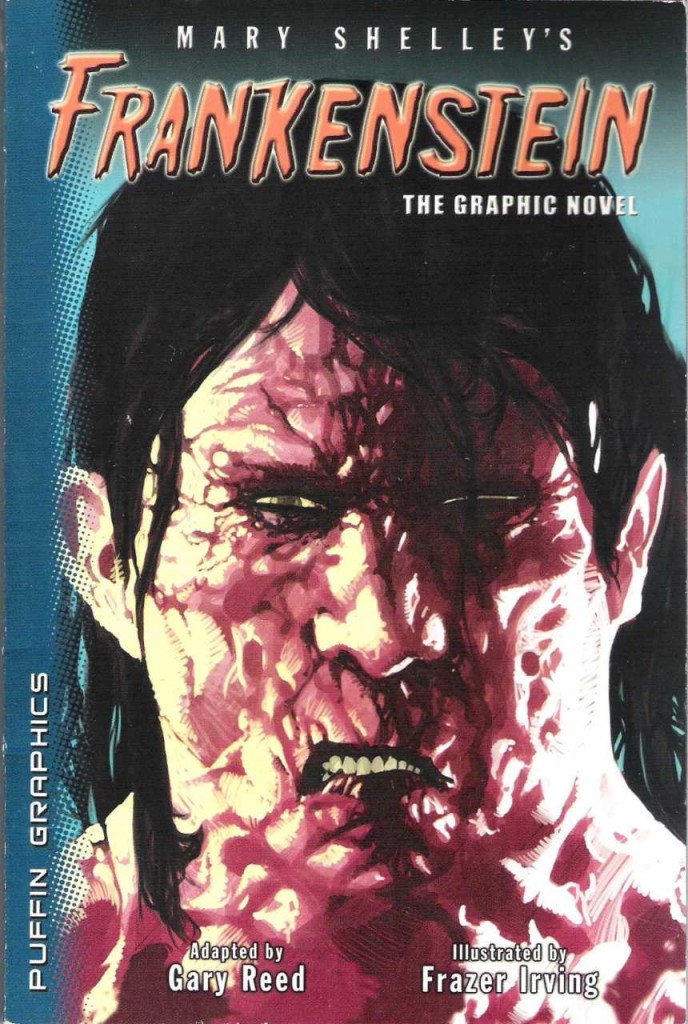
Going back to when you chose to close Caliber- a decision on that scale, are you the sort to second guess yourself, or do you trust your instincts entirely? And the years back in teaching- was that a peaceful time for you, or more of a Tell-Tale Heart ordeal?
I closed Caliber around 2000 or 2001 and the reason it’s kind of vague is because there was no official closing of the doors, it just sort of faded away. I operated it for awhile at my office in my house towards the end and just gradually receded that days started passing with no Caliber concerns until that was the norm. It was a decline of a couple of years for a myriad of reasons. We got hit really hard, I mean really hard, with the Power Cardz. I don’t want to go into it too much but we invested so much time, energy, and money into that because the payoff was huge, enough to keep Caliber going for years. The plan was to use the revenue to funnel into Caliber. But the printer messed it up and it wasn’t an accident, it was one employee who deceitfully screwed us over. His company was going to miss the deadline and therefore, be penalized on payment so he shipped part of the job to another printer out of state without our knowledge, and in fact lied to our faces about it, and they screwed up because they had no idea of the specifications. We had an incredible amount of purchase orders that were cancelled because of defective product. We’re talking in the millions.
About the same time, we learned our printer for graphic novels had defective glue and all of our graphic novels started falling apart. Now we had used this printer for years and they produced a lot of books for other publishers so I believe they were caught unaware as well. We had to have all the graphic novels reprinted and reshipped but then after a couple of weeks, the replacement copies also started falling apart. We relied heavily on our graphic novel business, that was the profit center for a lot of our titles, much like it is today.
Those combined with some other problems, again mostly with printers, hit us hard. Costs were shooting up, shipping was becoming increasingly more expensive, and the market was collapsing quickly. I not only felt it with Caliber but with my stores and by that time, I had closed two of them. It was overall, just a steep decline.
For many independents, the only way to survive, and this is true today as well, was to get licensed titles. I have nothing against licensed titles per se, but it’s not what I wanted to do. I get the strategy and it seems to be effective but I didn’t want to be chasing licenses.
Caliber still hung on for a couple of years but now we were scrambling to survive. The loss of Capital City years earlier also hurt as we sold a lot more books through them than we did with Diamond. Ironically, I think 1997 and 1998 were really good years for us sales-wise but you could almost see the writing on the wall. So, it wasn’t a case of one day there was a Caliber and the next day there wasn’t. As I said, it was gradual. I never really second guess myself because that just seems like a waste of energy.
The teaching wasn’t something I had planned on. I was talking to my brother and told him that things were pretty much closing up with Caliber. I was in discussion with a number of people as either a writer or editor but by that time, I wasn’t really satisfied with the comics market. It had turned away from what got me excited before. I detested the speculation aspects that had changed and consumed the direct market, so I wasn’t desperate to stay in the field. Anyway, he asked why I didn’t use my degree and teach and even mentioned that he saw an ad for a college that need biology instructors. So, I called and made an appointment with the Department Chair. An hour later, I left with keys to a lab, a textbook, and a class of students that I would be meeting the following Monday.
My Masters is in Biology, specializing in Molecular Genetics and I was going to be teaching a General Biology class. The thing was I had not even looked at anything to do with biology for some 17 years. I had to relearn things like cellular respiration and the Kreb’s Cycle, mitosis and meiosis, photosynthesis, and even basic genetics. But I discovered that I really enjoyed teaching and so I started doing it full time. Even though I have taught Anatomy and Physiology, Environmental Science, Nutrition, Evolution and Animal Behavior, I still enjoy teaching the general class the most as I like covering the wide array of subjects. I get a chance to delve into certain subjects in detail such as diseases and genetic engineering and deal with the ethical considerations of that. I enjoy the section on cell respiration in the body and explaining why we really don’t have to worry about a zombie apocalypse. Since I teach a lot of lab classes, I get to know the students pretty well through the semester.
But I never tell them about my comics background as that would just become a distraction. Some students find out but I downplay it quite a bit. It’s funny, one time a student was in class early and was actually reading a DeadWorld comic and never made the connection.
I still teach and still just about full time. I take the summers off and I can usually pick my own schedule. It’s nice have a retirement package and benefits and the pay is pretty good. If I wanted to work more in that area, I could probably double my income. So, I keep at the teaching while doing the writing and publishing again. It’s busy as hell but it just feels right.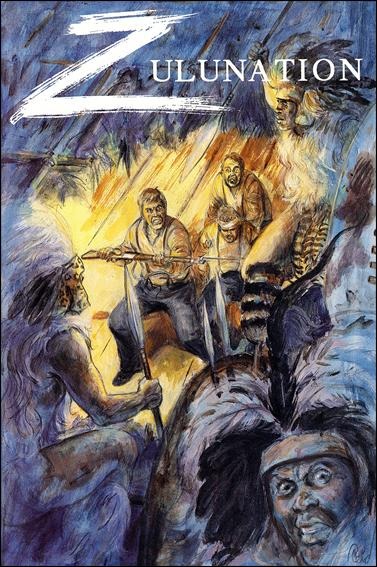
Regarding reanimation, you’ve kept DeadWorld going for years now. It has become, I think in the minds of many, the defining Caliber title. What about that nightmare world and its dwindling survivors has maintained your own interest for so many stories? Is it the chance to incorporate real-world sciences into the sub-genre, something generally lacking elsewhere? I mean, I can see now how your degrees have been used in the stories, such as the exploration of leprosy in War of the Dead- and in the same arc, how individual cells/souls of the greater whole of the encampments continue to waste and whither and break away. It’s like a huge parable for decomposition itself. Or do you just have a burning desire to portray in grand detail the full demise of our species?
My years with DeadWorld have taken an interesting turn. I did not create the original DeadWorld as that came from Arrow Comics and Caliber picked it up with issue 9. I got involved writing it soon after, first with plots and then by the end of volume one, which ran 26 issues, I was writing it. The series became a mess because we had so many artists that came on board and then got hired away that I had to mesh a number of storylines together as I was having the artistic teams handle certain characters so there would be at least some continuity. That’s why we started up volume two, to sort of re-establish things on a more consistent basis but it was not a reboot as it just picked up where volume one ended.
With the original DeadWorld, as a writer, I felt most like a caretaker with it. I felt it should stay the same. Back then, you didn’t radically change characters and storylines every couple of years which seems to be the norm now. I did do a back up series in volume one about a character known only as the Dead Killer and with that, I deviated from the regular series as far as tone and delivery went. That eventually led into a Dead Killer miniseries which ran between volumes one and two. There, my writing was more my own as Dead Killer was a character I created that was part of the continuity but not the storyline. The structure of Dead Killer, the narrative, even the dialogue was more of my natural style and it flowed a lot easier for me.
After a long hiatus with the close of Caliber, I brought DeadWorld back with Image Comics in what became the Requiem for the World storyline. Even then, I found myself balancing between the caretaker mentality of the original and my own interpretation. Requiem was a reboot but I wanted to pick up as many pieces of the original as I could. I did start introducing more of a scientific slant and I knew early on that’s the direction I wanted to take the series.
Even though DeadWorld was one of the first zombie comics, it still seemed a lot of the elements were the same as so many others…you know, oh, look-zombies! Shoot them in the head! Everything to do with zombies seemed to be running from zombies and the small pockets of civilization that popped up. When Sami Makkonen, with his surrealistic style, was interested in doing DeadWorld, I knew I had the right artist to go into a much darker, more desperate storyline. It would be a departure from the norm but I thought it was the right time. That was Slaughterhouse and it dealt with scientists infecting people with leprosy, HIV, cancer, and other disease to see what would happen if the zombies ate them…could these disease travel from one host to another? It was an attempt to stop the zombie plague-the sacrifice of the few for the good of the many. I kept the continuity started in Requiem but did move it to a different direction.
Of course, that led to War of the Dead which follows Slaughterhouse. The victims of the leprosy experiments found out they had an advantage…their diseases and decaying skin couldn’t be perceived by the zombies. The Lepers could walk with the dead. At the same time, King Zombie knew he had to take care of his growing army of the dead as they were running out of victims, out of food. So a deal was struck with some survivors. They would live in breeding camps where they were safe and could multiply but the old, the sick, and the disabled would be fed to the zombies. The character of Bowker, who is the ultimate survivor, realized what the camps were but at the same time, the human population would grow. To him, the idea of the camps, which he convinced humans to join, was a way of biding time for humanity while increasing the number of survivors.
In Restoration, the series that just finished up, things continued but it’s revealed that some humans are attempting to find a way to control the mindless armies. That’s human nature as you have a power grab during the midst of humans’ extinction. I would’ve liked to have these three storylines presented as an ongoing or a maxi-series but that’s the reality of the comics market today. You have to have the number ones to get people to even look at something different.
In reference to your question, yeah, DeadWorld does represent a microcosm of life. It’s often said about humans having such arrogance in thinking we can destroy the planet. Well, humans are arrogant and that is what drives exploration and expansion into new areas. While we can’t destroy the planet, we can destroy our ability to live on it. You can look at humanity as a disease of the planet if you want.
DeadWorld, of course, is centered on the dead but ultimately, it is about life. The issues of the last couple of years are essentially dealing with what will humans do in order to survive. If you look at life itself, that’s the basic function—to survive and to reproduce. As for the eventual demises in DeadWorld, I had one reviewer state that the whole situation was so bleak and desperate, that it was hopeless. The humans had no chance of winning. That may be but the characters in DeadWorld are at a point that they’d do anything to survive and it might be immoral, perhaps even evil, but they’re still fighting against extinction.
I have great faith in humanity in general and though it may not seem like it, I convey that to my characters in DeadWorld. We just haven’t seen it yet.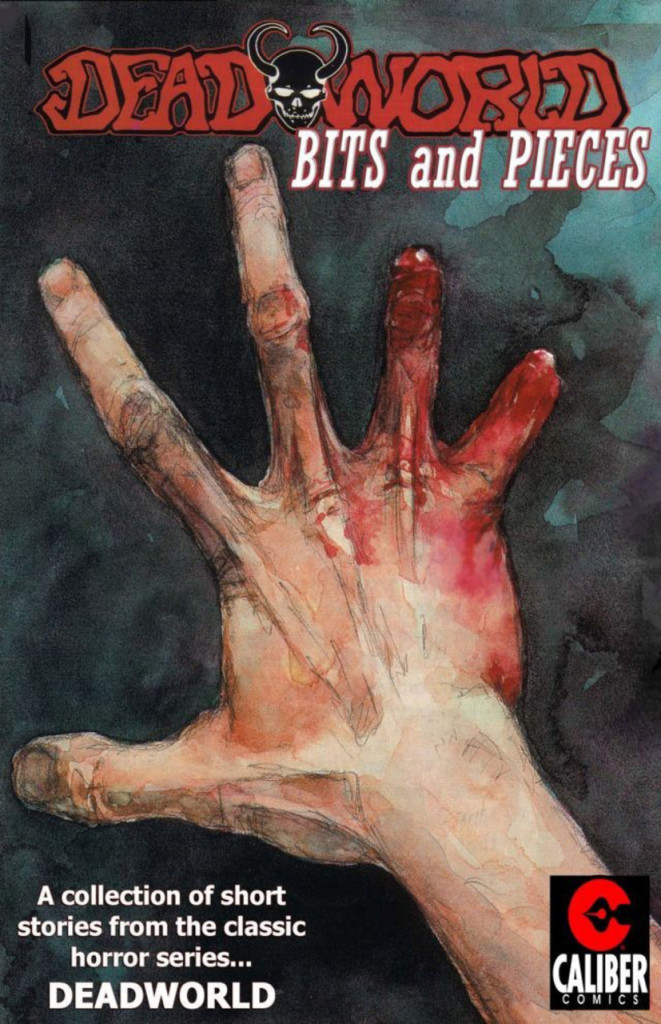
How exactly did your arrangement with Eagle One Media come about? Had you been sniffing around for such a thing very long? I mean, from an outsider’s perspective, it really looks as though your whole label is redefining itself, setting itself up for a renaissance.
I first became associated with Eagle One Media and Eric Reichert when he licensed DeadWorld to put all of the original issues on a CD-Rom. Eric was one of the first to venture into digital comics and he was exploring different areas. Since he’s local, we kept in touch about different things and he knew I was a bit away from comics at the time so he would offer suggestions and some came to pass, such as the Curious Cases of Sherlock Holmes being released at IDW.
In the last year or two, I was contacted by a number of different companies about either licensing some of Caliber’s titles or an outright purchase of Caliber. Eric was involved in one of those companies and he and I exchanged long emails back and forth…well, mine were long anyway. I didn’t want to sell Caliber and give up all my properties that I owned unless it was enough money to be a life-changing event and the offers that came in, weren’t. I was also talking with some companies that wanted to relaunch Caliber and they would invest large amounts of money to secure licenses and top talent to launch creator-owned books. Even with Image’s recent success on creator-owned books, I saw that the rates the creators wanted would generate market share and sales but not necessarily profit. I’ve always been more about profit than market share. Image has a model similar to the original Caliber one where creators work on the back end and keep full ownership. Granted, Image has much more of a presence in the market than Caliber ever did or could hope to have, so I do understand the different dynamics.
So, I didn’t really want to deal with securing licensed titles and didn’t want to be paying top dollar for creator-owned books and hope to eke out a breakeven company. Some of the potential investors wanted to exploit the Caliber library but they were basing potential on what they saw going on in the market with the superhero books. I had to explain to them that comic fans, and not just from Caliber, but anyone, are not going to fuel the launch of a movie. I don’t think most people realize just how few copies of comics sell, even the well known ones. The comic fans are the most vocal but they don’t drive the success of comic based films, they just don’t have the numbers.
As Eric and I talked, the digital world was expanding and I was licensing some titles to various digital providers. Unfortunately, it seemed that many were just throwing stuff out on the market and the reporting I was getting was inadequate and perhaps even fraudulent. That’s when I decided to end Transfuzion and roll everything into Caliber and bring in Eric to help coordinate things, especially the digital and other licensing. Transfuzion was originally started to just reprint my old stuff along with some friends such as my partner in that, Rafael Nieves. It grew well beyond that and we started releasing new material as well. As I said before, having an original Caliber title, published by Transfuzion, and then released as a digital book under Caliber digital just seemed not only confusing, but awkward so the best plan was to bring everything under one name and that was Caliber.
The plan now is to make sure we get every title we have available to us, mine and the ones that the creators entrusted to me to represent, into print and as many digital formats as possible. While we can’t guarantee any sales, we hope to at least give them all an opportunity to sell. It may only be a handful of printed books and a dozen or so digital downloads, but at least they’re available. Some titles do quite well in print, others don’t. Digital is too hard to tell at this point but early indications are that some will have pretty good sales. There are no costs to the creators so they’ll all make money…maybe just lunch money or they could earn some real income. In the last couple of years, some creators have made thousands of dollars off reprint books and I have a few creators that don’t have great sales in the market but they have sold hundreds at cons and that’s for full retail price.
The digital prep is incredibly time consuming, not only prepping the files but in presentation. We have an agency in Los Angeles also prepping the properties to take out to interested parties. One of my titles has been licensed for a product that will seem completely out of left field, and it is. Totally unexpected. It may not do well in the comics market but it could do well outside of it. I really don’t care where the books or properties sell, just as long as they sell.
So, right now, as you suggested, we are sort of redefining ourselves although that’s probably too radical of a term. We’re, as I said, more or less positioning ourselves. We’re signing up some new properties which will be announced when they’re ready to be released and I like some of them quite a bit. I don’t know if we’ll do well in the traditional comics market as that’s a pretty limited avenue. Sure, Image is really sky rocketing but overall, the market is down. I’d love to be doing what Image is doing as I really think it’s great that they’re building their market on creator-owned titles. In essence, they’re creating new content not licensing nostalgia, not rebooting a property every couple of years, and not milking a success until they drive it into irrelevance.
It’s funny, I have some creators who work with me that probably think I’m pessimistic, but really I’m not. I wouldn’t be doing this if I was. But I do try and keep it realistic and approach things on a pragmatic level. I even had one creator tell me that it would be nice if I would blow smoke up his ass once in a while just to make him feel good. And I could, but I won’t because that doesn’t accomplish anything. Yes, there are some working with us that don’t care about profit too much, they want the exposure in the comics market which they’ll hope will lead to something else down the road. I completely understand that approach, however, it’s pretty obvious that there’s only so much that’s going to work in today’s market. Even Image, along with some other companies trying to get into the creator-owned arena, are mostly relying on established creators who made their mark at Marvel and DC. Caliber doesn’t have that cache and while we may have had some in the original run of Caliber, that was a different era and no one cares about that anymore.
I don’t feel like I’m competing with companies like Image, Dynamite, IDW, etc. They do what they do and Caliber is there for creators who want to turn over some of the business side of things. I never go after titles because I know what Caliber is offering isn’t going to stand against what some of the others can bring to the table. But if they come to me and understand what we’re about, they know that their titles are going to be in print, will be on just about every conceivable digital platform, be available and pushed in Hollywood, and they’re going to own it completely. Sure, we get some rights, we have to, but only for a limited time. Basically, Caliber only promises what we know it can deliver. That’s a pretty simple approach and business model.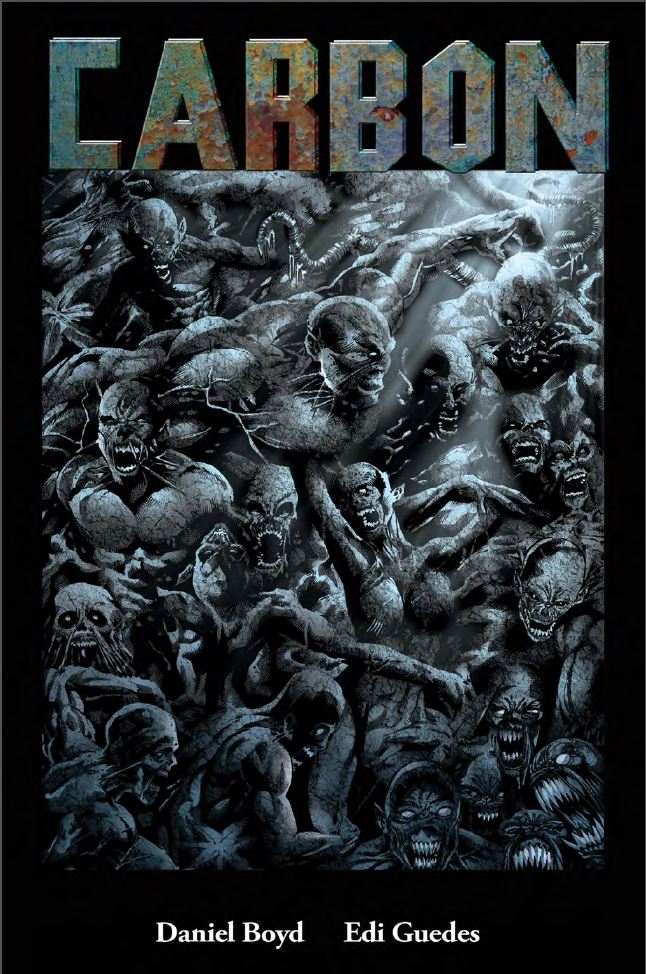
One of the newer Caliber creatives, and one of the last to hop the fence prior to the closing of Transfuzion, is film-maker Danny Boyd. I know you’re no stranger to Troma Productions, but as an example, what about Danny and his stories made you feel he’d have a place in your catalog? Your own contribution to the CHILLERS giant anthologies was sweet, but his new book CARBON carries more of a message about it than many comics today. Or ever, really.
Yeah, Danny came to me with Chillers, an anthology of horror stories centered on his Troma movie of the same name. We’ve done two of them so far and plan to do more. He also brought Carbon which I was actually reluctant to do at first. It was an original full color graphic novel and Transfuzion, although we had moved into doing some new material, was still primarily thought of as a reprint house. So, I didn’t feel it really fit enough which might be detrimental to the book’s success. He sent it around to some other publishers but never got a deal he liked. He’s passionate about the book and wasn’t willing to give up part ownership of it to some of the publishers that requested that.
As plans for Caliber started to ferment, Danny and I were in discussion about Carbon. I think he felt comfortable with me and although we don’t have the footprint in the direct comics market as many others, we had a lot of flexibility to do things in different ways. So, right after Caliber re-formed, Carbon was one of the first added to the lineup.
Carbon, even though it has a lot of action scenes, does fit into Caliber more than I originally anticipated. As you said, there’s a message there. It’s not one that is slammed on your head but it does deal with important environmental issues and Danny, having lived in West Virginia, the coal center of the US, had a very personal story at the same time. We both realize that it’s not a book that you just throw out with Diamond and the comic book shops and then move on, it has to be promoted on a more individual level. It’s not a comic about an environmental issue…it’s an environmental issue that just happens to be presented as a comic. That’s a big difference. So, we’re going after the environmental readers more so than the comic readers. That’s true of many comics, including some of the Caliber ones, in that you have to push the message or content rather than the format.
It’s too early to say how well it will do as we had to wait before really promoting it because we did put it out through the comics market. That required us to delay a massive push because if you’re going to use the comics market, the direct orders to stores via Diamond, you have to protect them. You can’t expect them to order months in advance and in the mean time, sell it directly to fans. Danny has done a few shows, more special events dealing with the environmental issues and mostly in his home state of West Virginia. But once we give the grace period to the shops, it will be available in many different formats and Danny’s already lined up a number of book signings, book festivals, environmental events, and so on. I don’t think the comics market will make up much of the overall sales but that’s okay.
Of course, the whole key is Danny. He’s incredibly passionate about the book and is a tireless promoter of it. The success of Carbon, and it will be very successful, is all due to Danny’s vision and drive. The response so far has been really positive and it’s good to see people get the message about it without having it be spoon-fed to them.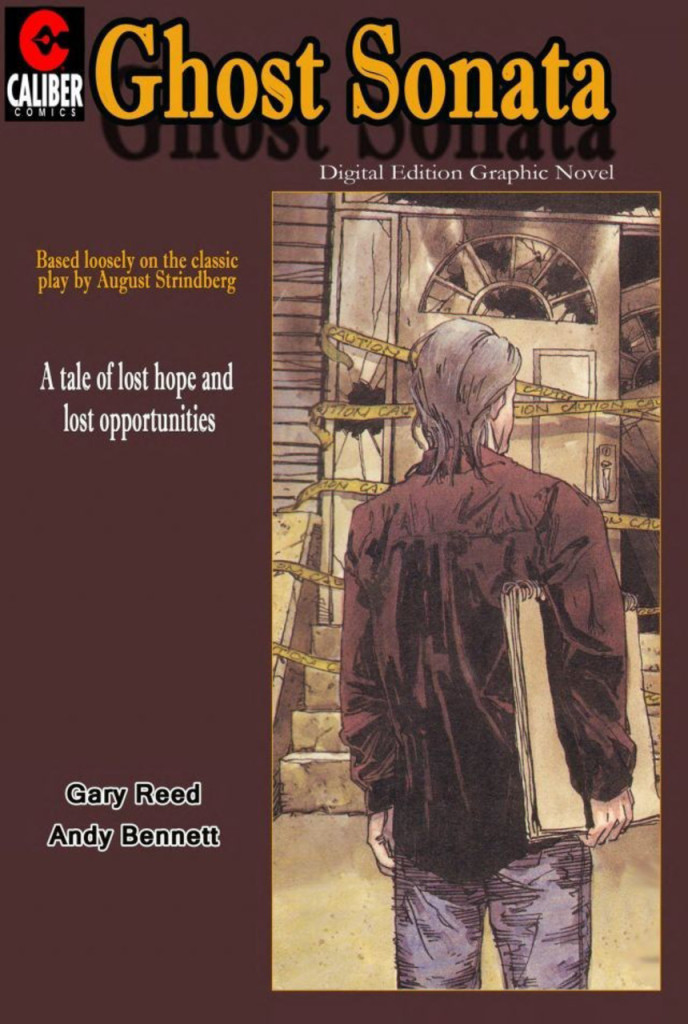
You’ve won several awards in the last couple of years alone, particularly for your excellent Night Pieces collection. You’re revitalizing Caliber, poised to release new books while keeping classics available in multiple formats. Things are looking up for you and your circle. Does it feel like a particularly positive time for you, or do you stay grounded regardless of opportunity?
Although certainly upbeat, I wouldn’t say it was a particularly more positive time compared to the past. I do try to stay grounded and pretty even keel on things. That’s not to diminish anything going on now but I guess I just really hadn’t sat back and reflected on things going on right now. Just too busy. I still teach full time and I’m involved in two other companies and of course, always deep into the writing. You can only do so much that you can control. Luck plays a role in a lot of things but of course, there’s not only good luck, there’s bad luck as well. You can only build your own world and if intrusions come in such as luck, fate, karma…whatever you want to call it, well, they’re pretty well defined by their unpredictability.
I think one of the keys to satisfaction is having an awareness of who you are and what you want. Yeah, I know it sounds like a cliche and even a bit patronizing, but there’s a lot of truth to it. I understand that I’ll never be a household name in the comics world. I write what I want and I realize that I don’t appeal to a lot of the traditional comic audience. And I’m okay with that. I get it. Sure, I could tailor my writing to try and be more popular or try to work on popular titles, but overall, the price isn’t worth it. We all make choices and that’s my choice and I have no problem living with it.
Of course, I’d love to have my book sales be better- everyone does. We all like the money part of it but that has never driven me. I’m not scrounging around to write for a paycheck. I think having to take jobs writing can move the act to a mechanical aspect instead of being creative. I get asked often why I haven’t written anything for Marvel or DC. There’s two simple reasons. One is that I’ve never been officially asked. The other obvious reason is that I’ve never inquired. Since I haven’t read a DC or Marvel universe title in nearly 20 years, I wouldn’t even know where to start. I’m sure there would be some licensed characters that would be intriguing but I haven’t really thought about which ones. I have done a couple licenses and frankly, they felt more like a job than writing.
There’s a definite division between the original Caliber and the new Caliber. The original one has a legacy to it. I know that a lot of fans just look at it as another small publisher from the 90s but I think it made quite an impact for a company its size. If you look at the names that came out of Caliber who are working in the business today, there’s a lot of fan favorites. Between the awards of the Eisners, the Harveys, and the Don Thompson Awards, which are no longer around, I think Caliber had over 30 nominations in 8-9 years. What I really think is indicative of Caliber is the new talent awards, whether the Eisners or the Russ Manning Award. Caliber had 8 or so nominations which means on average, every year, we had someone nominated at Best New Talent. With the number of publishers and comics coming out in the 90s, I think that says a lot.
That’s what Caliber is probably best known for, the talent that came out of it. I get asked often if I knew who was going to make it big or not when I signed them up and that’s almost impossible to tell. There’s a lot more than talent to make it. Early on, we had Vince Locke and Guy Davis, even though they actually got their start with Arrow. But along the way you had Patrick Zircher, Dean Haspiel, Mike Allred, Jim Calafiore, Greg Ruth, Michael Perkins, David Mack, Brian Bendis, Ed Brubaker, Georges Jeanty, Marc Andreyko, Mike Carey, Brandon Peterson, and so many others. We also published established names like Neil Gaiman, Alan Moore, Moebius, Dave Dorman, and even a cover from Todd McFarlane. Lots of names came through the original Caliber. I never knew who was going to persevere and who would flame out. There’s a few creators that made a splash but have never really followed up with anything new. Of all the new talent coming into Caliber, the two guys I thought had the most potential were Michael Lark and Greg Ruth. But that could be just my personal bias as I liked their styles a lot.
I’d like new Caliber to grow, that’s a given. The larger it gets, the more we can do. I’m not rebuilding Caliber with Eric for altruistic reasons, we both want the abilities to expand into different areas. I think anyone that puts themselves out in the market, any market, has to recognize the ego aspect and the financial possibilities. But overall, I like where we’re at right now and where we’re going. It still feels like we’re building something and that’s important…to always be moving ahead and building something.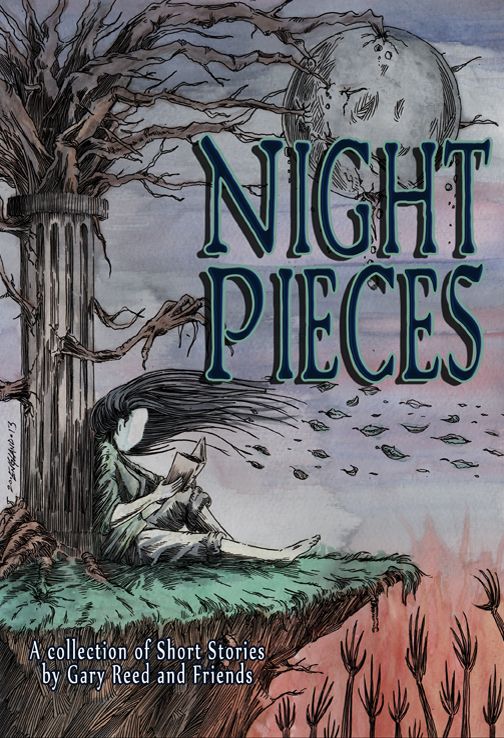
For more Reed, check out the official Caliber website, as well as his own website, and follow him on Twitter.
All images copyright and/or trademark their respective copyright and/or trademark holders.
The Lottery Party is © 2014 Richard Caldwell. All rights reserved.

Leave a Reply